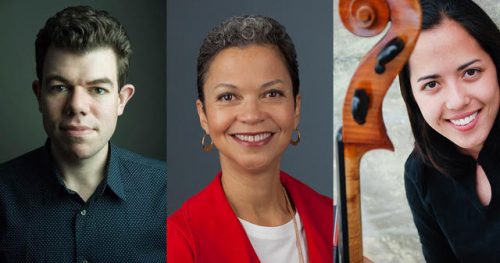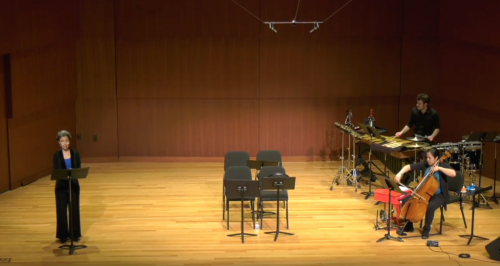 United States Kander, dwb (driving while black): Roberta Gumbel (soprano), New Morse Code, Baruch Performing Arts Center and Opera Omaha. Performance recorded at Lawrence Art Center, Lawrence, Kansas, and viewed on YouTube. (RP)
United States Kander, dwb (driving while black): Roberta Gumbel (soprano), New Morse Code, Baruch Performing Arts Center and Opera Omaha. Performance recorded at Lawrence Art Center, Lawrence, Kansas, and viewed on YouTube. (RP)

Production:
Director and Producer – Chip Miller
Videography – Four/Ten Media
Audio – Ryan Streber, Oktaven Studios
‘Toto, I’ve a feeling we’re not in Kansas anymore’. Many people in the Sunflower State who live there today, or anywhere else for that matter, regularly echo Dorothy’s quizzical observation in The Wizard of Oz for any number of reasons. An equal number would likely be impressed by the cutting-edge musical performances and the extraordinary musicians who live and work in the state, if Susan Kander’s chamber opera dwb (driving while black) is any indication of what can be experienced there.
Kander, whose music has been heard across the United States, Europe, China, Russia, Australia and South Africa, composed dwb in 2018 for soprano Roberta Gumbel and New Morse Code, which is comprised of cellist Hannah Collins and percussionist Michael Compitello. The opera received its premiere at the Lawrence Art Center in January of the following year.
Gumbel, who is on the voice faculty of the University of Kansas, not only appears in the performance of dwb, she also wrote the libretto. The story she created is an intimate glimpse into the life of a wife and mother, which in many ways brings to mind Schumann’s song cycle Frauenliebe und -leben. The obvious difference is that Schumann’s cycle, while seemingly told from the woman’s point of view, was the work of men. Moreover, both Gumbel and her protagonist are Black.
dwb operates on two levels – one personal, one external – both textually and musically. We not only experience her joy at being a new mother, her husband’s death and her struggles as a single mother, but also the outside noise of bulletins that flash news of the harassment and false arrests of people of color. The latter are generally summed up as someone being in the wrong place at the wrong time. Twelve-year-olds are no exception.
The scenes play out in the family car. We experience a mother’s pride over her son getting a B+ on an exam; his father would have said a Bs are for buttheads, but she rewards the achievement with ice cream. There is anger in both mother and son. She pleads with him to strike her with his rage and tears but not his hands. The final vignette is of her teaching her son to drive. For a sixteen-year-old boy, a car means freedom, but his mother is practically paralyzed with fear. Her precious child is being sent into a world over which neither she nor he has any control.
It is an opera of firsts – Gumbel’s first libretto, Kander’s first collaboration with a librettist and her first time working with New Morse Code. Collins and Compitello, who also teach at the University of Kansas, formed the ensemble to create a body of works that explore the sonorities of cello and piano, as well as many other things that make noise.
Kander centered the score of dwb on the vibraphone because it offers so many different timbres and durations of sound and easily provides a harmonic bed. Compitello, however, hits, swipes, rubs, blows and kicks 20 other instruments, while Collins plays not only the cello but also the toy piano, tambourine and other percussion instruments. At one point they let the air out of balloons which swoosh through the air. The duo performs another scene almost entirely without instruments using their bodies, a twenty-first century reference to juba or ham-boning. Collins and Compitello are remarkable musicians, as compelling to watch as to listen to.

Kander’s score for dwb achieves those illusive but magical qualities of complexity, excitement and beauty. Her lines can be a vocalise that expresses profound emotion or dry recitatives that report the news. There are also beautiful melodies for the voice and instruments that are full of hope and joy. With her silvery soprano, Gumbel sings with an emotional range as wide and penetrating as the colors of her voice. Collins and Compitello are equally essential to the telling of the story, expert at expressing emotion musically and physically.
The New York premiere of dwb was to have taken place this past March at Baruch. Given the brevity of the work and the pause in live performances, the three organizations – Baruch, Opera Omaha and the Lawrence Art Center – collaborated to create a high-quality version of the opera for streaming. There is no set, just a platform, and the basic, stark lighting lends a vintage early-Sixties feel to the video.
One final word on Kansas. The state’s motto is Ad astra per aspera (to the stars through difficulties). The words could likewise describe this taut, riveting 50 minutes of musical theater, which surely must rival live performance for integrity and intensity.
Rick Perdian
To view dwb (driving while black), click here.
